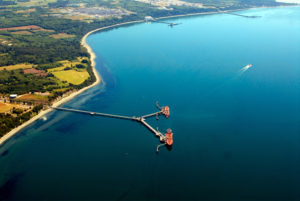 “The U.S. Army Corps of Engineers sided with Northwest tribes Monday in a decision to block the largest proposed bulk-shipping terminal in North America at Cherry Point, finding it detrimental to treaty-protected tribal fishing rights,” the Seattle Times reported this afternoon. (Read story here.)
“The U.S. Army Corps of Engineers sided with Northwest tribes Monday in a decision to block the largest proposed bulk-shipping terminal in North America at Cherry Point, finding it detrimental to treaty-protected tribal fishing rights,” the Seattle Times reported this afternoon. (Read story here.)
Image: Artist’s conception of Cherry Point coal terminal
This decision effectively kills the controversial project, which was opposed by a broad coalition of environmentalists, tribes, clean energy advocates, and ordinary citizens.
There is no rail route through the North Cascades. To get from Wyoming’s coalfields to Cherry Point, the coal trains would have had to pass through downtown Seattle on surface tracks, then clatter through suburban neighborhoods on tracks along Puget Sound’s shoreline beneath bluffs lined with million-dollar homes.
The Powder River Basin, occupying northeastern Wyoming and part of southeastern Montana, from Billings in the north to Casper in the south and the Black Hills to the east, contains vast quantities of high-quality, low-cost coal. But it’s inland, and North America’s west coast is almost devoid of natural harbors, making port facilities few and far between.
Cherry Point is already a major industrial site. Since 1971, it has been home to a major refinery that processes Alaskan oil into gasoline, diesel fuel, and jet fuel. Now owned by British Petroleum, this refinery supplies 20% of Washington’s gasoline and 85% of SeaTac Airport’s jet fuel. Superficially, it’s a logical site for a coal export terminal. But the oil comes in by sea, whereas there is no convenient rail route to Cherry Point, nor is one feasible.
And then you have climate change, and the whole issue of burning coal and greenhouse gases and whatnot. The defeat of the Cherry Point coal terminal won’t stop China’s coal pollution. But at least Americans won’t be as complicit in it.